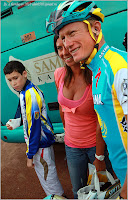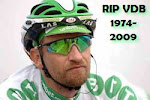"What was he, a Master of the Universe, doing down here on the floor, reduced to ransacking his brain for white lies to circumvent the sweet logic of his wife?"
Such is the predicament of millionaire bond trader Sherman McCoy, a self-styled Master of the Universe, in the opening chapter of Tom Wolfe's Bonfire of the Vanities, a satire on the decaying class, racial and political structure of New York in the 1980s.
In the light of recent developments, you could seemingly replace Alberto Contador for the adulterous McCoy, the doping laboratories and baying media for his wife, while the thing that's decaying is the core of professional cycling and its organisational bodies. As for the white lies, well, they remain white lies - if you believe all the rumours.
Cycling has been riddled with mendacity in recent years. In any walks of life, those in the wrong more often than not don't actually believe they are doing anything bad in the first place. Certainly not in relation to their immediate surroundings. Take Sherman McCoy, for instance. As a Master of the Universe, he is entitled to do as he pleases – especially given the temptations around him.
"Technically, he had been unfaithful to his wife. Well, sure … but who could remain monogamous with this, this, this tidal wave of concupiscence rolling across the world? Christ almighty! A Master of the Universe couldn't be a saint, after all … It was unavoidable. For Christ's sake, you can't dodge snowflakes, and this was a blizzard! He had merely been caught at it, that was all. It meant nothing. It had no moral dimension."
Most would agree that there has been over the years a tidal wave of transgression rolling across a peloton lacking a certain moral dimension. Doping is unavoidable, many say. What's more, it's not a sin as long as you don't get caught.
The minds of many top cyclists snared for their indiscretions appear to mirror that of Wolfe's banker, who sees himself incorrigible, on a different level both ethically (his extra-marital affair) and legally (he mows down and leaves a young boy for dead in the Bronx).
The Contador "situation" means all of the winners of the previous 15 Tours de France – with the exception of Carlos Sastre – have now been associated with (or accused of) doping, have admitted doping or, in one case, have been stripped of their title for doping.
It gets worse. Only this week, convicted doper Bernhard Kohl told an anti-doping symposium in Colorado that it was "impossible to win the Tour de France without doping". The best riders, he inferred, cannot be saints.
It gets even worse: former rider Roy Sentjens, who retired this year after testing positive for EPO, said it was not even possible to reach the Tour top ten without doping (quite how one of his former Lotto team-mates - a staunch anti-doper who finished runner-up on two occasions while the Dutchman was on his squad - feels about this is anyone's guess).
It gets worse still: this week, a 78-year-old Italian anti-doping prosecutor claimed that all professional riders - with no exception - take banned substances.
Such a generalisation is as dangerous as it is patently incorrect (much like the notion that all bankers are b------s) and yet the sad thing is that it may not be as far from the truth as we previously thought.
But let's forget the final outlandish statement and accept, hypothetically, that the first two assertions are true (Saddles isn't going to question the credibility of Kohl and Sentjens in this blog because he'll be here till the Basque cows come home for their daily dose of clenbuterol).
Say they're true, that you can't win or even make the top ten without doping, and you can begin to comprehend why someone like Floyd Landis was so determined to clear his name back in 2006 - or why, for that matter, Contador feels so aggrieved now.
Sure, Landis knew he had doped, but he may have had good reason to believe that those standing either side of him on the podium had done the same. He was clearly adamant (or at least, says he was) that a certain former team-mate had won seven consecutive races using similar preparations.
Landis, like the fictional McCoy and the real-life top bankers who brought the world's financial institutions to a halt with their arrogance and misplaced aura of invincibility, believed himself to be a Master of the Universe. And Masters of the Universe can't be saints.
Sticking to the world of banking, take the example of French rogue trader Jerome Kerviel, who on Tuesday was given a three-year jail term and ordered to pay back the 4.9 billion euros he lost his bank Societe Generale.
Kerviel was no Master of the Universe - he was a mere domestique of the banking world in comparison to Grand Tour contender McCoy; more of a Sentjens than a Landis, if you will.
The trader's lawyer said his client would appeal the "totally unreasonable and unbelievable" judgement. "Kerviel is disgusted," he said, stressing that the court had judged that the bank "was responsible for nothing, not responsible for the creature that it had created."
This is a similar defence made by convicted dopers: they are not to blame, but cycling and its inherent doping culture is. "I have the feeling Jerome Kerviel is paying for an entire system," the lawyer added - something the lawyers of Landis, Ricco, Kohl, any convicted doper could all say.
For once they're caught, dopers are hung out to dry like a piece of beef biltong. And in the cycling food chain, the knives can turn on anyone - even the most cocksure of predators, the Masters of the Universe themselves.
The question we now have to ask is whether Contador is a real McCoy – or if he is a bona fide victim of the freak contamination he claims to be.
Let's look at the evidence. Last week Saddles suggested that Contador's tainted meat excuse was so unfeasible it must have been true; this week, BS would say it seems simply unfeasible.
Many readers gave Saddles beef for overlooking the then latest development in the case - namely that Contador has received a blood transfusion which left plasticizers in his blood as well as clenbuterol - but the blog was written before that angle had been broken in the German press.
At the time, Saddles believed he was in the right in stressing the episode contained more hot air than a cattle farm - but given how things have panned out, BS admits he was perhaps too hasty in coming to Bertie's defence.
While it's natural to presume everyone innocent until proven guilty this whole affair has proved that in cycling the opposite rules must apply: everyone is guilty until proven innocent. And that is a sorry predicament. [What follow are the lost paragraphs.]
The contaminated meat line is now beginning to look almost as much of a chimera as the guff about Tyler Hamilton's unborn twin. The Astana chef's initial line that the beef came from Pau is contradicted by Contador's claim that it was brought for him across the border in Irun by the organiser of the Vuelta a Castilla y Leon (a race the Spaniard has won on three of the previous four occasions).
That doesn't even answer the question as to why Contador was eating beef on the rest day in the first place (a practice not usually done in big races). Presumably, the next line will be that the meat was wrapped in cling film made from the same type of plastics found in blood bags. Or that it was accompanied by a plate of boil-in-the-bag rice.
Put simply, today's youth would dismiss the beef excuse is one big epic fail. Saddles wouldn't go so far, but he might suggest that it was a slight red herring.
Contador has known since 24 August that he failed this doping test - and this is the best he can come up with. In the six weeks that passed before the story broke, why had he not traced down where the beef came from, whereby sorting out his defence? And if, as Contador stated, the UCI had assured him it was a case of food contamination - why had the cycling body not further investigated the matter?
The answer, perhaps, is that the story wasn't meant to break. Contador may have been told he should keep quiet about the whole thing - probably to save the flagging reputation of the sport. When the story was reported, both he and the UCI were perhaps caught unawares and with their pants down. Now that would be a decaying structure.
Since being caught in the headlights, Contador has been both contrite (crying into the cameras) and bullish (denying any wrongdoing with all the arrogance of a Master of the Universe).
Pulling the strings, the rider has said he will say no more about the case and has even threatened retirement if a positive resolution is not made within 10 days.
His ex directeur sportif has issued a staunch statement of defence - something he tellingly failed to do when his own rider, Fuyu Li, blamed contaminated meat for a positive test for clenbuterol six months ago.
Contador's principle rival over the French roads in July also came to his sudden defence on Twitter, stressing how he was shocked about the "crazy" news and how he hoped Contador was innocent and would be given the right to defend himself.
Sadly, Blazin' Saddles has it on very good authority - from blood doping specialists with inside information on the biological passports of cycling's top riders who echo the sentiments of Kohl and Sentjens - that the Contador conundrum could well be just the tip of the iceberg.
But given that so much was seemingly done (for whatever reason) to keep the Spaniard's positive under wraps, it's unlikely we'll ever see what is lurking under the surface.
Just pause and think, though. What development would be the worst case scenario for the UCI, the Tour, cycling in general should Alberto Contador be stripped of his title and the yellow jersey awarded to the runner-up who matched his every move but for a slip of a chain?
Towards the end of the Bonfire of the Vanities, Wolfe's narrator asks: "Who but an arrogant fool would want to be a Master of the Universe - and take the insane chances he had been taking? […] The Master of the Universe was cheap, and he was rotten, and he was a liar."
Let's just hope these similarities with Wolfe's work are all just a coincidence.
Ever since he was bullied by his brothers into watching the Tour de France as an eight-year-old, Blazin' Saddles has been a cycling fanatic. As persistent as Voigt, as fast as Abdoujaparov, as voracious as Ullrich and as accurate as a Festina watch, Blazin' Saddles offers a lighter take on the oft-grave world of professional cycling. The self-styled best cycling-blog pedlar in the business, BS refutes sullied claims of doping levelled by his rivals: these nuggets are powered on Gerolsteiner fizzy water alone. Just ask BS's friend Bernhard Kohl for a reference. An edited version of this post originally appeared at Yahoo! Eurosport.































